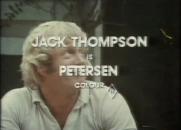AustLit
Latest Issues
AbstractHistoryArchive Description
An exploration of conflict between university-educated middle-class liberalism and self-made working-class values, Petersen sees an electrician and former Aussie Rules football star make a life change by rejecting the 'suburban' values of his former life and 'beer-swilling, ignorant mates' and going to university. He enrolls in an Arts degree and soon finds that his ingenuous, extroverted nature and natural physical aggression make him welcome with fellow students and academic staff alike. He becomes involved in a public demonstration of love-making as a protest against sexual conventions, is involved in a fight with some bikies at a party, and has an affair with a married tutor, Trish. However, when Trish decides to take up an appointment at Oxford and her husband fails him in an examination, Petersen becomes bitter and angered by the betrayal. He subsequently rapes Trish and returns, defeated, to his former career as an electrician.
Publication Details of Only Known VersionEarliest 2 Known Versions of
Works about this Work
-
“Smash Sexist Movies” : Gender, Culture and Ocker Cinema in 1970s Australia
2022
single work
criticism
— Appears in: Journal of Australian Studies , vol. 46 no. 2 2022; (p. 181-195)'The 1970s is often characterised as the decade of Australia’s “new nationalism”, expressed most potently in a wave of cultural activity nurtured by government funding. The figure of the ocker was central to this new nationalism, particularly in film. The ocker, a contemporary masculine archetype devoted to beer, sex and swearing, was a star of Australian films such as The Adventures of Barry McKenzie, Alvin Purple, Petersen and Don’s Party. Yet few scholars have considered the ocker in a gendered context, remarkable when we consider that while the ocker films were being produced, the women’s liberation movement was mounting a radical challenge to Australian cultural, social and political norms. What new understandings of 1970s society and culture might result if we read the new nationalist ocker and women’s liberation in the same frame? This article examines the relationship between ocker culture and women’s liberation in the 1970s. It argues that we can read new nationalist popular culture as a site of gendered cultural contest, with a particular focus on feminist responses to ocker culture, including Alvin Purple, and a reading of the film Petersen.' (Publication abstract)
-
Interview : David Williamson
Jim Davidson
(interviewer),
1979
single work
interview
— Appears in: Meanjin , Winter vol. 38 no. 2 1979; (p. 173-186) Sideways from the Page : The Meanjin Interviews 1983; (p. 164-183) David Williamson 1988; (p. 83-97)
-
Interview : David Williamson
Jim Davidson
(interviewer),
1979
single work
interview
— Appears in: Meanjin , Winter vol. 38 no. 2 1979; (p. 173-186) Sideways from the Page : The Meanjin Interviews 1983; (p. 164-183) David Williamson 1988; (p. 83-97) -
“Smash Sexist Movies” : Gender, Culture and Ocker Cinema in 1970s Australia
2022
single work
criticism
— Appears in: Journal of Australian Studies , vol. 46 no. 2 2022; (p. 181-195)'The 1970s is often characterised as the decade of Australia’s “new nationalism”, expressed most potently in a wave of cultural activity nurtured by government funding. The figure of the ocker was central to this new nationalism, particularly in film. The ocker, a contemporary masculine archetype devoted to beer, sex and swearing, was a star of Australian films such as The Adventures of Barry McKenzie, Alvin Purple, Petersen and Don’s Party. Yet few scholars have considered the ocker in a gendered context, remarkable when we consider that while the ocker films were being produced, the women’s liberation movement was mounting a radical challenge to Australian cultural, social and political norms. What new understandings of 1970s society and culture might result if we read the new nationalist ocker and women’s liberation in the same frame? This article examines the relationship between ocker culture and women’s liberation in the 1970s. It argues that we can read new nationalist popular culture as a site of gendered cultural contest, with a particular focus on feminist responses to ocker culture, including Alvin Purple, and a reading of the film Petersen.' (Publication abstract)
-
cAustralia,c
- 1970s




